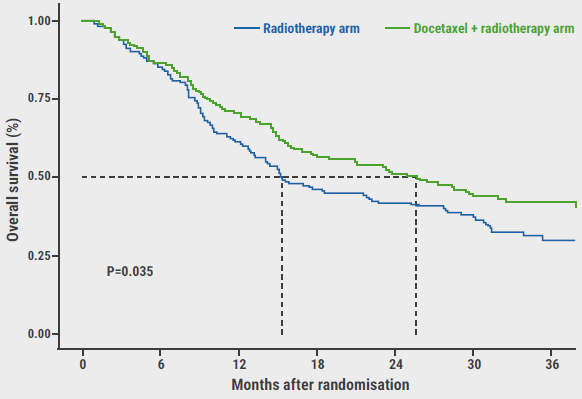https://doi.org/10.55788/ff6e6173
Although chemoradiation with cisplatin is a main standard therapy for patients with LAHNSCC, patients who are unsuitable to receive cisplatin are not uncommon. Prof. Vanita Noronha (Tata Memorial Hospital, India) discussed a phase 3 trial that randomised patients with LAHNSCC, who were ineligible for cisplatin, to radiotherapy alone (n=176) or docetaxel and radiotherapy (n=180) [1]. The main outcomes of the trial were DFS and OS after 2 years, quality-of-life, and adverse events (AEs).
The 2-year DFS was significantly higher in participants who received docetaxel and radiotherapy than in participants who received radiotherapy alone (42% vs 30.3%; HR 0.67; P=0.0021). Likewise, the 2-year OS data favoured participants who received docetaxel over those who did not (50.8% vs 41.7%; HR 0.75; P=0.035; see Figure). The results of these efficacy endpoints were consistent across prespecified subgroups. Furthermore, the functional assessment of cancer therapy – general (FACT-G) score displayed lower reductions in quality-of-life for patients receiving docetaxel at 6 months (-25.4 vs -40.5; P=0.035).
Figure: Overall survival results of docetaxel plus radiotherapy versus radiotherapy alone [1]

AEs that were more common in the docetaxel-radiotherapy arm than in the radiotherapy alone arm included grade 3–5 mucositis (49.7% vs 22.2%; P<0.001), grade 3–5 odynophagia (52.5% vs 33.5%; P<0.001), grade 3–5 dysphagia (49.7% vs 33.0%; P=0.002), and any grade weight loss (51.4% vs 36.4%; P=0.005). Grade 3–5 hyponatraemia was also more frequently observed in the docetaxel-radiotherapy arm (30.2% vs 19.3%; P=0.02).
“The improved DFS and OS in cisplatin-ineligible patients with LAHNSCC who received the addition of docetaxel to radiation represents a new reference standard-of-care for this group of patients,” concluded Prof. Noronha.
- Noronha V, et al. Results of phase 3 randomized trial for use of docetaxel as a radiosensitizer in patients with head and neck cancer unsuitable for cisplatin-based chemoradiation. LBA 6003, ASCO 2022 Annual meeting, 3–7 June, Chicago, IL, USA.
Copyright ©2022 Medicom Medical Publishers
Posted on
Previous Article
« Ifosfamide is likely to be the go-to therapy in recurrent Ewing sarcoma Next Article
Bacterial decolonisation effective against radiation dermatitis »
« Ifosfamide is likely to be the go-to therapy in recurrent Ewing sarcoma Next Article
Bacterial decolonisation effective against radiation dermatitis »
Table of Contents: ASCO 2022
Featured articles
Breast Cancer
Sacituzumab govitecan meets primary endpoint
Shaky OS results of palbociclib in ER-positive/HER2-negative breast cancer
Practice-changing results of T-DXd in HER2-low breast cancer
SET2,3 to inform on chemotherapy decisions in ER-positive breast cancer
Metastasis-directed therapy fails in oligometastatic breast cancer
Analysis by residual cancer burden further clarifies effect of pembrolizumab
Contribution of metastatic therapies on mortality reduction in breast cancer
Radiotherapy may be omitted in breast cancer patients
Promising data for ribociclib after progression on ET plus CDK4/6 inhibitors in HR-positive/HER2-negative metastatic breast cancer
7-gene biosignature: Benefits of endocrine therapy and radiotherapy in breast cancer risk groups
Lung Cancer
Additional tiragolumab does not help patients with untreated small cell lung cancer
Success for serplulimab plus chemotherapy in small cell lung cancer
Adagrasib safe and clinically active in non-small cell lung cancer
Long-term benefits of combined immunotherapy over chemotherapy in non-small cell lung cancer
Effect of KRAS mutations and PD-L1 expression on therapy response in non-small cell lung cancer
Melanoma
First results on distant metastasis-free survival in stage II melanoma
Higher response rates for concurrent triple therapy versus sequential therapy in melanoma
Genitourinary Cancers
Exploratory treatment options fail in ccRCC
Adjuvant everolimus did not benefit high-risk renal cell carcinoma
Cabozantinib fails as first-line maintenance therapy in urothelial cancer
177Lu-PSMA-617 is a valid treatment option for PSMA-positive mCRPC
Enzalutamide performs well in metastatic hormone-sensitive prostate cancer
Haematologic Malignancies
Autologous stem cell transplantation plus RVd improves PFS in multiple myeloma
Novel first-line treatment option for mantle cell lymphoma
Promising results for novel CAR-T therapy in relapsed/refractory multiple myeloma
Gastrointestinal Cancers
Panitumumab beats bevacizumab in RAS wildtype left-sided metastatic colorectal cancer
Spectacular results for dostarlimab in mismatch repair deficient rectal cancer
Triplet chemotherapy beats doublet chemotherapy in colorectal cancer liver metastases
To resect or not to resect primary tumours in stage IV colon cancer?
Novel treatment option for KRAS wildtype pancreatic cancer
Gynaecological Cancers
Primary results of rucaparib in ovarian cancer
Trabectedin not superior to chemotherapy in recurrent epithelial ovarian cancer
Encouraging results of relacorilant in ovarian cancer
Miscellaneous Topics
Bacterial decolonisation effective against radiation dermatitis
New standard-of-care for cisplatin-ineligible locally advanced head and neck squamous cell carcinoma
Ifosfamide is likely to be the go-to therapy in recurrent Ewing sarcoma
Dabrafenib plus trametinib candidates for standard-of-care in BRAF V600-mutated paediatric low-grade glioma
Related Articles
© 2024 Medicom Medical Publishers. All rights reserved. Terms and Conditions | Privacy Policy
HEAD OFFICE
Laarderhoogtweg 25
1101 EB Amsterdam
The Netherlands
T: +31 85 4012 560
E: publishers@medicom-publishers.com

